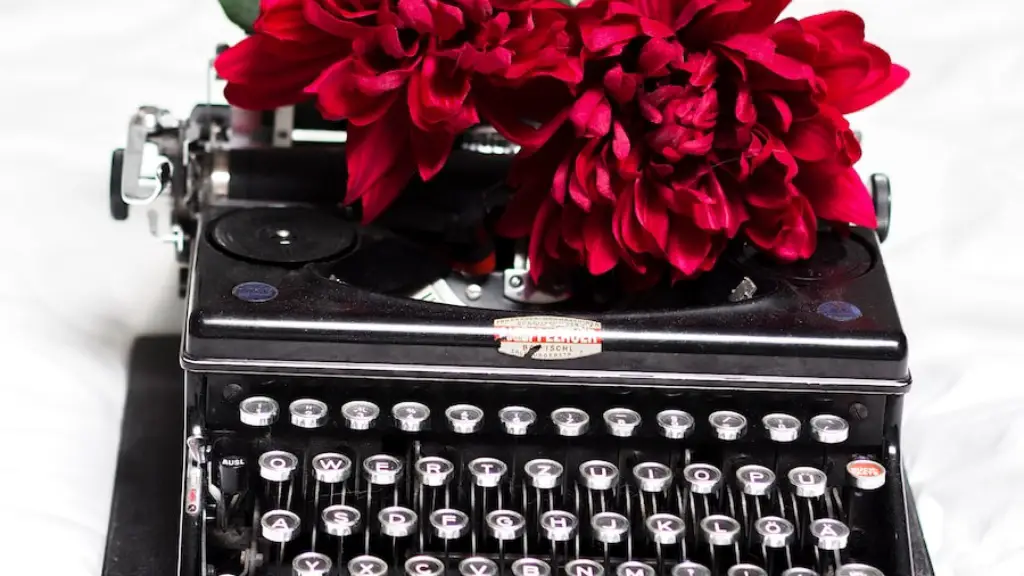The concept of theme in poetry is an often overlooked area of poetic study. Simply put, the theme of a poem is the central idea or the message behind the poem. The words, phrases and images that are used to get this message across are known as the elements of poetry. Theme is usually conveyed in a single line, or a group of lines, within a poem. It’s the thread that runs through a poem, and is often the subject of argument, analysis and discussion among readers and critics.
Determining the theme of a poem can be tricky. To get the most out of a poem, readers must pay attention to the language, imagery, and figures of speech. For example, if a poem speaks of nature in connection with death, it may explore the transient nature of life. If there are references to religion, then perhaps the poem is exploring themes of faith and redemption. It is important to remember that the poem should be interpreted in its own context. A poem may reveal more than one theme, with each being expressed in varying levels of subtlety.
Exploring a poem’s theme can help readers to gain deeper insight into the writer’s intentions. A good way for readers to identify the theme of a poem is to look for its main message or “moral”. Generally, this will be expressed through imagery and language, and may require careful reading to discern. It is also important to consider whether the poem was written in an emotional or intellectual state, since both can affect the way the poem is produced and received.
Traditionally, the study of theme in poetry has focused on the idea of ‘message’, or how poems communicate emotional, personal and intellectual content. In recent years, however, critics have also begun to look at themes related to time, history, identity, culture, and gender. The range of topics explored in modern poetry is vast, and the themes can range from the personal to the philosophical. Readers should work to identify not just the themes of a poem, but also the ways in which the poet is crafting a story with the poem.
Through the careful study of a poem’s themes, readers can gain a better understanding of the poet’s thoughts and feelings. It is no wonder that the exploration of themes has remained such an integral part of poetry analysis. By looking at the various elements of a poem, readers can begin to appreciate how the themes add meaning and shape the overall effect of the poem.
What Role Does Context Play?
It is essential to consider the context in which the poem was written, as this can give readers a better insight into what the author was trying to express. Different cultures, historical periods, and geographic locations will all contribute to a poem’s overall message, so it is important to understand these elements in order to gain a deeper understanding of the poem. By looking at the different elements and influences of a poem’s context, readers may be able to draw out further themes and connections.
It is also important to consider current events and popular culture for an understanding of a poem’s intended meaning. Many poetics draw inspiration from current affairs, works of art, music, films and more. By looking for traces of influence from the greater cultural landscape, readers may be able to draw out additional themes in the poem.
Finally, readers should also look to their own experiences and feelings when exploring a poem’s theme. Often times, the same poem will be interpreted differently by different people, and individual experiences and emotions can provide unique perspectives. Every reader will bring their own unique perspective to the poem, and it is important to consider as such when analyzing a poem’s theme.
What is a Tone?
Tone can be an important aspect of conveying a poem’s theme. Tone is an author’s attitude towards a subject or a character, and can be seen in the poem’s word choice, structure, and the imagery that they employ. In the same way that words carry a certain meaning, the tone of a poem can also be used to further emphasize the poem’s theme. Tone can be used to create an atmosphere for the poem, and to suggest the emotions behind its message.
As with any artistic work, interpretations of a poem’s theme can change over time, as it is seen in different contexts and from different perspectives. Exploring a poem’s theme can provide readers with deeper insight into the poem, and can give them a better understanding of the author’s intention.
How Can Theme be Used Creatively?
When writers compose a poem or story they must decide on a theme, often with an overall message or moral in mind. This theme will inform the writer’s choices of language, structure, and characters. By utilizing the theme, a writer can create tension and interest throughout the work, and ensure that their story or poem will be engaging and meaningful.
In addition to establishing a thematic focus, writers must also consider how their theme will be expressed. Will the theme be conveyed through symbols, metaphors, and other figurative language? Maybe the writer chooses to structure the poem to illustrate the themes, or to make use of an extended metaphor in order to explore multiple meanings. All of these considerations are made in order to ensure that the poem or story effectively communicates the theme in an interesting and meaningful way.
What is a Symbolic Meaning?
Symbolic meaning, or symbolism, is an important part of exploring a theme in poems. Symbols are objects that have an underlying meaning, and are used to signify a deeper message within the poem. Symbols are used to evoke emotions or ideas, and can be used to point to a greater meaning or idea. Common objects used in poetry as symbols include flowers, colours, animals, objects, and numbers.
The poet will carefully choose symbols that they feel are most appropriate to convey their desired message, usually in order to express an emotion or idea that is not as easily communicable in words alone. Readers should be aware of the themes presented in the poem, and then look for symbols that may hint at darker or more profound meanings.
What is a Theme Poem?
A theme poem is a poem written on a single idea or concept that has been chosen by the poet. Theme poems tend to focus on a single theme or main idea, and explore this idea in a variety of ways. The poet may choose to focus on a particular emotion or idea, or may use the poem to explore a wider range of concepts in relation to this central theme.
Theme poems are a great way to challenge the writer and to take a deep dive into a particular subject matter. By writing a theme poem, the writer has more freedom to express their thoughts and feelings on a particular topic, and can explore a variety of perspectives and interpretations. Theme poems can also help writers improve their craft, as they are usually shorter and more focused than traditional poetry.
Conclusion
Theme in poetry refers to the main message, point, or idea that the poem is attempting to communicate. A poem’s theme may be implied through its language, imagery, structure and figures of speech, and is usually explored in relation to its cultural, historical, and personal context. The poet also utilizes tone and symbolism in order to further convey their desired theme. Finally, a theme poem is an excellent way for writers to explore a particular concept or idea in a concise and focused manner. Exploring a poem’s theme can give readers a deeper insight into the poet’s intentions, and can provide a unique experience.




